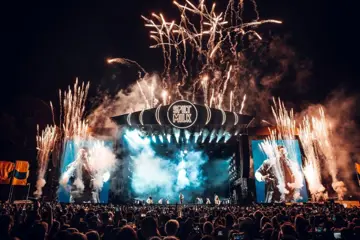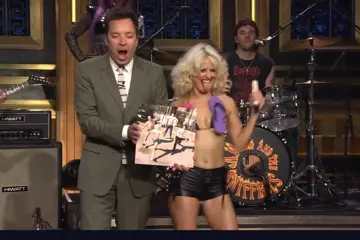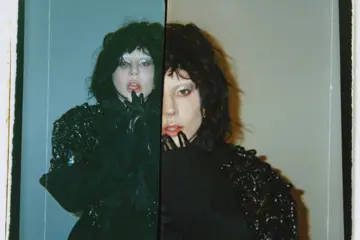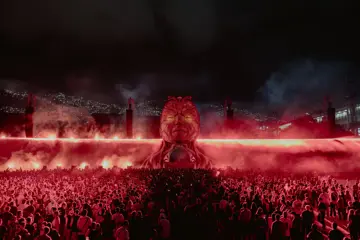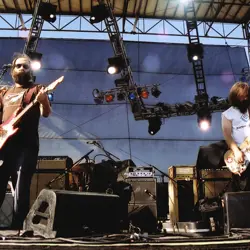 Built To Spill
Built To SpillWhilst hardly even a household name, over the last 20-plus years Boise, Idaho indie outfit Built To Spill have carved out a rock-solid niche as one of the most consistent and dependable rock bands in the business. Their recently-dropped long-player Untethered Moon is their eighth studio effort since they formed back in 1992, and there’s nary a dud song in their hefty catalogue let alone a bad album.
Originally conceived as a floating line-up which would revolve around frontman and songwriter Doug Martsch – a vision which has partly come to fruition, although guitarist Brett Netson (also of Caustic Resin) was there at the outset and has been present for much, although not all, of the band’s trajectory – Built To Spill have become renowned for their ability to flit between bendy, sprawling jams and tight, economic arrangements as if flicking a switch. Untethered Moon is one of their more succinct efforts in that the band’s more expansive tendencies have been reined in a tad, but it’s still defiantly Built To Spill. Its gestation was long and slightly convoluted – the best part of six years have ticked by since their previous effort, 2009’s There Is No Enemy – but not because of any other reason than life got in the way a couple of times.
“Just time started going faster, I guess,” Martsch smiles of the gap between records. “We made the last record and toured a bunch, and then we actually went into the studio in 2012 – me and the other old rhythm section – and recorded a lot of this stuff and a few other songs to make an album, then those guys quit. I was just kind of burned out – I wasn’t really too into the way the record was turning out – so we bagged it. Then we spent a year getting the new dudes acclimated to the band, and then maybe a year rehearsing and making the record. So we didn’t really ever stop doing anything, it just took a long time to get the record done.”
"I kind of looked at this record as a record of time..."
The departed rhythm section – Brett Nelson (bass) and Scott Plouf (drums) – were quickly replaced by newcomers Steve Gere (drums) and Jason Albertini (bass), and the fact that the pair were already in the Built To Spill orbit prior to their call up probably explains why they’ve fitted in so seamlessly so quickly.
“Those guys are just incredible.” Martsch marvels. “They’re dudes that I’ve always wanted to play in a band with – they’re both a couple of my favourite musicians – so it was just a really fortunate thing that they were already a part of our crew and just took over. We played our first show about a month after the old guys quit – because these guys were right on top of it – and they’re amazing, those guys could do anything so we’re really lucky. Jason has been our all-round crew dude for ten years or more, and he also plays in [Seattle experimentalists] Helvetia; Helvetia were on tour with us, so he was working for us and also riding in the bus with us doing Helvetia. And then Steve has come out with us before to record us, but this time he was out just playing bass for Helvetia. They’re rad.”
Was there any major reason for Nelson and Plouf departing the ranks?
“They were just burned out,” Martsch shrugs. “They’d been doing it for a long time and wanted to do some other things. Brett I think just didn’t want to be on the road – he’s playing with some other guys – and Scotty is just done. His body is giving him some trouble too, playing drums so much for so long, so he hasn’t even picked up his drumsticks since he quit the band.”
Strangely, so much water has passed under the bridge since they began working on what would become Untethered Moon that the frontman can’t even recall precisely how the scrapped version of the album differed from the finished product even though a lot of tracks where on both versions (in differing forms).
“I don’t know, it’s been a while and I can’t really remember,” he ponders. “I think they were different – we did rework them a bit. The original versions were less ‘worked out’ – we didn’t really rehearse too much – and I kinda wrote them a little simpler. Half of the songs were done, and there were some other different songs that were on the original record. We ended up reworking the songs and adding parts to a couple of them, and changing the feel here and there. So they are definitely different. I was happy to scrap the record when the other guys quit – I was relieved, and glad to have a chance to redo it. I just wasn’t feeling it.”
"We did it all on 16-track when we could have used 24-track, just to limit ourselves"
Martsch explains that he didn’t even know what he wanted the album to sound like in those formative stages, and just waited to see how its tone panned out.
“That’s just something that kind of happens – that’s not a conscious decision,” he explains. “The things that were conscious about it, I guess, are that we were really adamant about keeping it simple and not doing a lot of overdubs. I kind of looked at this record as a record of time, like a document of what we were up to at this stage of our career and what we sounded like, rather than how we’ve done it in the past where I’ve tried to make something that would be above and beyond what I was capable of. I used to push things really far and try to make a sort of ‘piece of art’. This time I wasn’t thinking about it that way as much, and just approaching it, like, ‘This is what we sound like at this time’.
“So we did a couple of things to make sure we kept it simple; one thing was getting [producer] Sam Coomes involved, and he was really about keeping it simple. Anytime I had tendencies to start overdubbing stuff he would slow me down. And then we did it all on 16-track when we could have used 24-track, just to limit ourselves. We ended up bouncing things into ProTools world and adding a few extra tracks onto some songs, but some songs are really stripped-down and there’s not much really going on at all – to me that’s the main thing that comes to mind for me for the tone of the record.”
Was it liberating just capturing a moment and not attempting to make some grand statement?
“Yeah, I think it really was,” Martsch muses. “I had a great time making this record – I never really thought of that being the reason before, but it’s really obvious that that might have been the very reason. You know what it is too? I’m very insecure about my voice and about my guitar playing abilities and stuff, so I’d often just be adding things just to cover up things I didn’t think were very good. Just kinda ear candy to distract people away from something else that I didn’t like; that’s an exaggeration, but there was definitely some of that going on on our records. Sometimes I think it did work though, but I don’t think it was quite really what I had in mind. This time it’s also more like what I like to listen to; I think when Built To Spill started there weren’t very many bands who came out of punk rock and stuff who were doing lots of layers and textures in their music, but now tons of people are doing it because it’s easily done with all of these home-recording studios. Plus a lot of people just have a better feel for it than I really do, so I just decided to make the kind of music that I like to listen to which is usually pretty minimal.
“Most of the punk rock and rock stuff that I like is usually pretty stripped-down, and I like to hear what everyone’s up to and not have a wall of sound where you can’t really tell what’s going on. Whenever we made records and I was making these walls of sound I was trying to make it so you could hear everything that’s happening, but years later I’d hear it or someone would tell me that it’s just a wall of sound and that things weren’t that distinct. You had to be there in the studio laying it all down to hear it all. So in a way I guess I feel successful on this record because I’m making music more like what I was originally trying to do.”
"I’m very insecure about my voice and about my guitar playing abilities and stuff, so I’d often just be adding things just to cover up things I didn’t think were very good"
Despite his protestations to the contrary, Martsch is forever lauded for his excellent textured guitar playing – and rightly so too – but sometimes it seems that his adroit skill as a wordsmith can be overlooked. Untethered Moon is another great batch of lyrics, but its creator doesn’t believe that there’s any major themes or any concepts tying the songs together.
“I don’t think so. There’s some concepts and words that might pop up here or there, but it’s just universal stuff. I take lyrics seriously, it’s just not my forte – they’re hard for me to do and if they didn’t have to be there then I probably wouldn’t include them. But since they do [have to be there] I take them very seriously and work hard on them,” he laughs. “They’re not about anything – I’m not trying to say anything to anyone – they’re just sort of unconscious or subconscious notions and stuff that people can take and do what they want with.
“[Creating the music] is just easier for me. I think it’s very rewarding when I come up with a lyric that I like, but it’s just so uncommon and so difficult that it’s the least fun part of writing songs. The other parts are more natural. I’m not a writer – I can’t write an email that’s more than three sentences for some reason. I’m not a very verbal person.”
Their incredible live shows have long been one of Built To Spill’s main strengths, and while they’ve played a few of the new tunes already it seems that there’s still a bit of work to be done in that regard.
“We’ve been playing Living Zoo for a couple of years and we’ve just learnt a few of the other ones,” Martsch tells. “Next week we have to practice again and learn a few more – we’ll probably play five or six of them during the tour. Living Zoo has always been fun to play live, and then a couple of ‘em haven’t really worked out yet, so I’m not quite sure what to do – we need to work on them a little bit and make them fun to play, because they aren’t very fun so far. They just don’t feel quite right yet.”
The band’s older songs must by now be like putting on a comfy pair of shoes when they’re trotted out onstage – is it strange when have to learn new songs and actually pay attention?
“Totally, but it’s fun too. It’s a blast, like a whole different feeling,” Martsch enthuses. “Sometimes it’s a blast to play a song that you know so well, you can just let loose and like you said it’s like a comfortable pair of shoes – you know exactly what’s happening – and then the songs you don’t know well, like a new cover or when we re-learn an old song, it’s a blast just flying by the seat of your pants, when you’re thinking about what part is coming next or counting the times you’ve gone through a part and struggling to remember lyrics and things. Whereas with other ones you’re thinking, ‘Hmmm, I wonder what we’ll be having for dinner tomorrow?’ while you’re in the middle of some complex part of a song.”
Finally, will Australian Built To Spill fans be lucky enough to see the band down this way again on this album’s tour cycle?
“If you’re lucky enough? If we’re lucky enough!” Martsch chuckles. I assume we’ll make it, probably not this year or in early-2016, but I’d be surprised if we’re not there in a year or so.”


